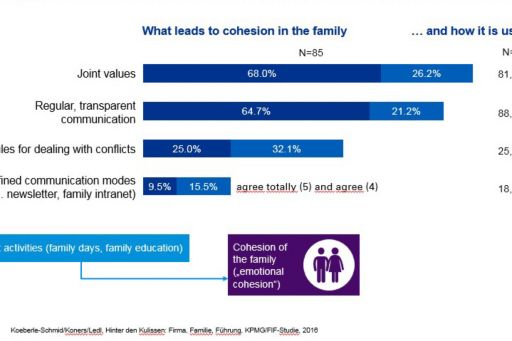A family constitution can increase family cohesion and business connectivity– leading to economic success
The benefits of a family constitution
Family-owned businesses in Germany who adopt and implement a family constitution, with binding rules, are often economically more successful. Moreover, a family constitution can strengthen the “family glue” (emotional cohesion) and helps to build the relationship between the family and the company (emotional ownership).

The advantage of a family constitution is that it ensures clarity and transparency and families know what to do when disagreements arise. In addition, it strengthens the family’s emotional cohesion because the shareholders work together to formulate the family constitution. 87 percent of German family businesses firms with a constitution do report that they will eventually come to a consensus even when they have differing opinions. This is only the case in 71 percent of families without a constitution. Regarding emotional ownership, 93 percent with a constitution say that the family business is an important part of their life, in relation to 85 percent without a constitution. These results confirm that intensive discussions in an environment viewed as safe, leads to a high degree of trust, openness, and attachment. This is even confirmed by those shareholders who were at first skeptical of developing a family constitution. Thus, the family constitution ultimately acts as an indispensable link between the family and the business. Businesses without a family constitution are therefore more likely to be susceptible to crisis.
Furthermore, a family constitution also has an effect on the economic success of the family business. Half of entrepreneurial families with at least three shareholders and a constitution, report having an annual return of more than five percent. For those without a family constitution, most (48 percent) reported an annual return below five percent. The reason is that the constitution also regulates many areas of the management structure within the company, like the advisory board, management succession, profit distribution, and the process of selling shares.

Three step process - a family constitution
When establishing a family constitution, a three step approach should be followed:
- Identify the individual needs: On average only one third (35%) of entrepreneurial families have a family constitution. As a rule: the higher the number of shareholders, the more important a family constitution becomes. This is because the cornerstones of the management structure are usually defined in the family constitution.
- Develop the family constitution together: The constitution should be jointly created by the family owners through workshops and with the help of a consultant. This can take between six to twelve months - after all, a guiding culture has to be well defined, morally binding and, in part, result in legal documents like shareholder agreements. In addition, visions, goals and structures are to be defined, succession rules to be made, strategy, business models, roles and plans to be developed. To sum it all up, by developing a family constitution, shareholders work together to find answers to the following questions:
- Where do we come from as an entrepreneurial family business (history and tradition)?
- Where are we now (current situation)?
- Where do we want to go (goals and visions)?
- What are the guiding principles (family and business values)?
- What makes us stand out (competitive advantages)?
- How do we make decisions (succession, dividend policy, new investments etc.) ?
- What governing bodies do we need (board of directors with independent, non-family directors, family manager, family council etc.)?
- And who will take on which tasks for how long?
- Living the family constitution: A family constitution is never fully completed. It has to be put into practice and lived. A family constitution should be reviewed and adjusted regularly, after all (shareholder) structures and economic conditions can change.
Family council and managers advised
The absence of core and commonly accepted and followed (family) values may cause the company to falter. For this reason, it may be useful to establish a family council and/or a family manager in addition to the family constitution who is responsible for joint events, trainings and social engagement - and if needed for conflict management.
As a rule: the larger the circle of shareholders, the more frequently entrepreneurial families fall back on a family council, specific rules for the handling conflicts and special communication modes such as family newsletters or family video conferences.
Shareholders are rarely concerned about money
Since many of the family members are often shareholders who are not directly working in the company, those family members who are working in the business tend to face challenges trying to satisfying the needs of the other family shareholders.
Some of the areas that are most important to shareholders include creating a simple advisory mandate or having a family manager, but others may desire to be involved in important business decisions. Some may be involved through a well-functioning flow of information or others through being able to contribute in foundations or family days. The financial aspect, that is, the profit distribution towards the owners, is interestingly at the end of the list among areas of importance to shareholders. Contrary to assumptions, it is only in the rarest of cases that money is the main motivation for members of family enterprises.
Methodology for this blog
The blog was created using the core findings of the study, (Regulated) Emotions in Family Firms by KPMG in Germany and the Friedrichshafen Institute for Family Entrepreneurship (FIF) of the Zeppelin University. The study surveyed 85 family-owned businesses with 14 individual interviews conducted. It examined for the first time the emotional structure that German entrepreneurial families express regarding the ownership of their family businesses and to what extent individual family members stand together. These new discoveries are a continuation of the research into the "emotional factor" in family businesses.



